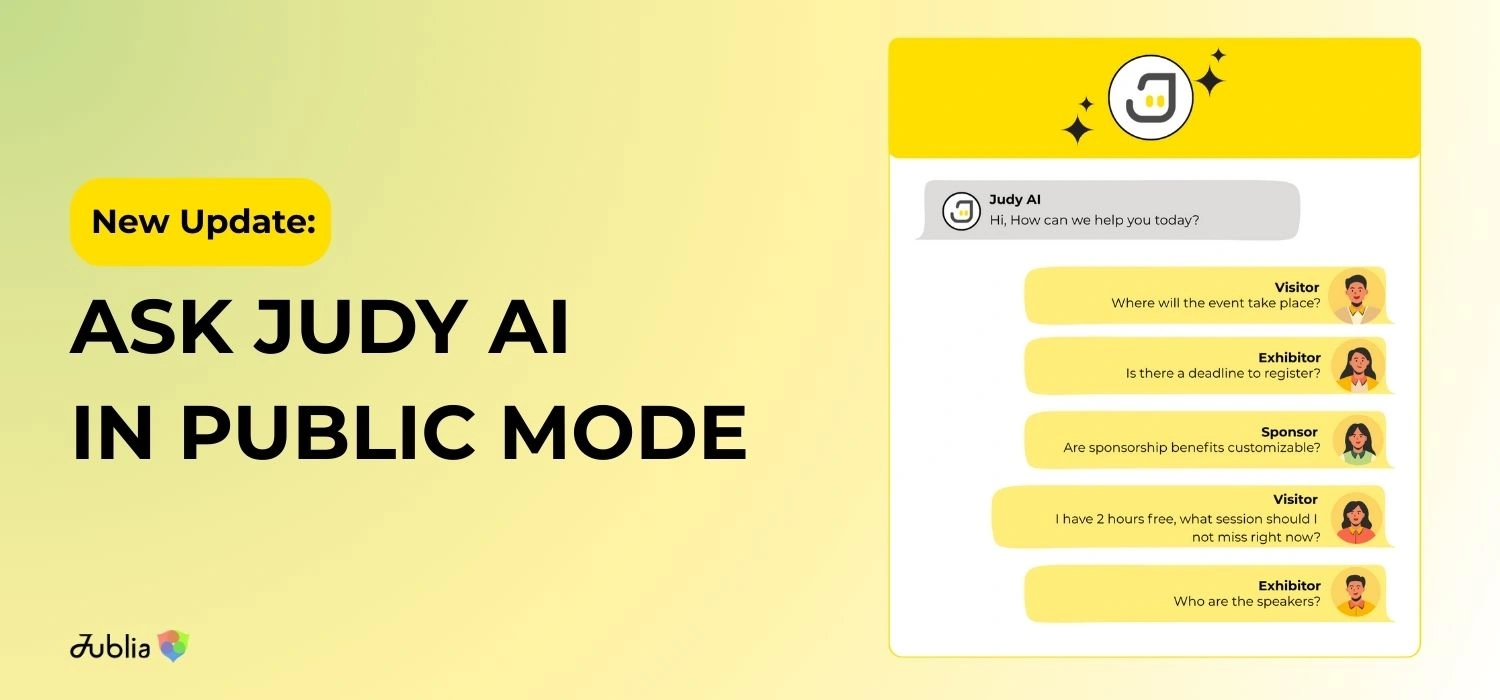Join our newsletter for the inside scoop on Jublia and the events industry

.png)
Challenges never seem to pull themselves away from event marketers. In recent years, they need to work their way out of the global health challenge that practically changes the usual way people interact and business runs. As the world gradually returns to in-person interactions, event marketers are faced with a new challenge: balancing the use of digital technologies in live events to maximize their impact.
The industry is now witnessing the coexistence of three different event formats, and event marketers have to tackle all the challenges that come along — especially from the live event’s angle. Let’s buckle up to visit the major post-pandemic challenges for live event marketing, and how to overcome them.
The events industry started 2023 on a more positive note than the previous year as live events are returning to claim back their throne. But the term “returning” does not mean they are going back to the pre-pandemic era.
For the past two years, event stakeholders found themselves enjoying the automated, streamlined processes that the digital platform offered. Once they step one foot to attend live events, they encounter the hassle of moving between one session and another, not to mention getting lost inside the venue and wasting their valuable time. This can be a frustrating experience, and it can deter attendees from returning to future events.
Thus, the integration of digital solutions and live events becomes important, as the first will enhance the physicality of the latter to boost engagement and, at the same time, provides valuable insights for planners to analyze attendee behavior and preferences for future events.

For example, to address the venue navigation hassle, Jublia offers AI Maps on Web, a groundbreaking solution that takes event planning to the next level. It offers an interactive floorplan of the venue that helps attendees locate booths and sessions before the event even begins, allowing them to create a more efficient personal schedule and save valuable time and energy. By extending the benefits of interactive floorplan to pre-event days, Jublia is transforming the event planning experience and enhancing the overall event experience for attendees, adding one more value worth highlighting to the event.
As soon as the world started to exit the pandemic, the economic headwinds increased the pressure on budgets, and event marketers are facing a new set of challenges: balancing tight budgets with the need to deliver successful events. With a Skift Meetings report showing that 65% of event marketers are reducing their requirements to cope with stretched budgets, it's clear that finding cost-effective ways to reach their targets is a top priority.
However, despite these hurdles, UFI's Global Exhibition Barometer research predicts that revenue levels are expected to reach 94% of 2019 levels on average and up from 80% in 2022, excluding China. This leaves marketers with the difficult task of maximizing their resources to create events that not only meet their goals but also stand out in a crowded market.
A dependable event technology platform is key in helping marketers overcome the challenge of limited budgets and still achieve success in their events. With a robust digital ecosystem, organizers can showcase the value of their event and attract more participants, making it a win-win situation for everyone involved.
In the second half of 2022, Skift Meetings reported that the in-person event attendance rate stalled at 65% after the pandemic. It proved that getting attendees has never been easy. Hence, according to Forbes, 62% of marketers agreed that creating demand for an event is their biggest challenge.
With so many events competing for attendees’ attention, it's crucial to have a solid marketing strategy in place to attract and retain them. Many will say that offering them benefits such as early-bird offerings will do some good, but it requires more than that to persuade the audience to actually register themselves as attendees.
Try to shift the focus to what kind of experience they could gain from the event through its sessions, exhibiting companies, and people they can establish a network with. Thus, allow the audience to take a sneak peek at the event, even before they hit the register button.
Jublia answers the need through the Public Hub, a zero-cost feature available in the Engagement Hub that allows anyone to access an event platform without login requirements. The essential elements of the event include sessions, exhibitors, attendees, and the venue layout.

Jublia Public Hub allows attendees to immerse themselves in the event experience by roleplaying as if they were at the event and planning their agenda for the day, attendees can get a taste of what the event has to offer, increasing their interest and likelihood to attend.
Furthermore, event marketers can easily share the event platform link across their marketing channels to reach a wider audience and attract more attendees to their event.
“Storytelling is a powerful technique for building relationships. It's an age-old concept that brings people together and keeps them engaged.” — QuickSprout
While having advanced technology to power an event is essential, effectively delivering the message to the audience is just as crucial. A successful event marketing strategy often relies on generating interest and creating a compelling story around the event can be a powerful way to market it to the public.
Neuroscientists’ research has shown that human brains engage more fully with stories than with information alone. When they can find the relevancy between the story and their actual experience, it creates a connection that influences the behavior.
With 78 percent of event planners using more technology (Skift Meetings, 2022), creating a story that centers around the benefits of what those digital solutions can do for the event attendees will bring the event in a more positive light. Let’s go back to the interactive floorplan, which can provide the same level of convenience to attendees in finding their next meeting booths as they use the GPS on their phone to look for their destination.
It will shed light on how they can save more time and energy, and that venue navigation is no longer a hassle.
Successful event marketing strategies will generate positive impacts on all of the stakeholders. Jublia Engagement Hub is capable of providing a number of marketing channels with zero cost but high effectiveness. Talk to our Solutions Specialists to know more about it by dropping a message to info@jublia.com and following our LinkedIn today to keep up with our future updates!
 From Tools to Intelligence: Why 2026 Will Redefine the Event Tech Playbook
From Tools to Intelligence: Why 2026 Will Redefine the Event Tech PlaybookInsights from Jublia’s founders on what it takes to build AI-native events in 2026
 Ask Judy AI in Public Mode: AI Chatbot for Your Event Website & Platform
Ask Judy AI in Public Mode: AI Chatbot for Your Event Website & PlatformCapture conversations, drive conversions, and spark interest for public audience
 Optimizing Engagement at Top Food Equipment Show
Optimizing Engagement at Top Food Equipment ShowA Case Study on Gulfood Manufacturing & GulfHost 2024


